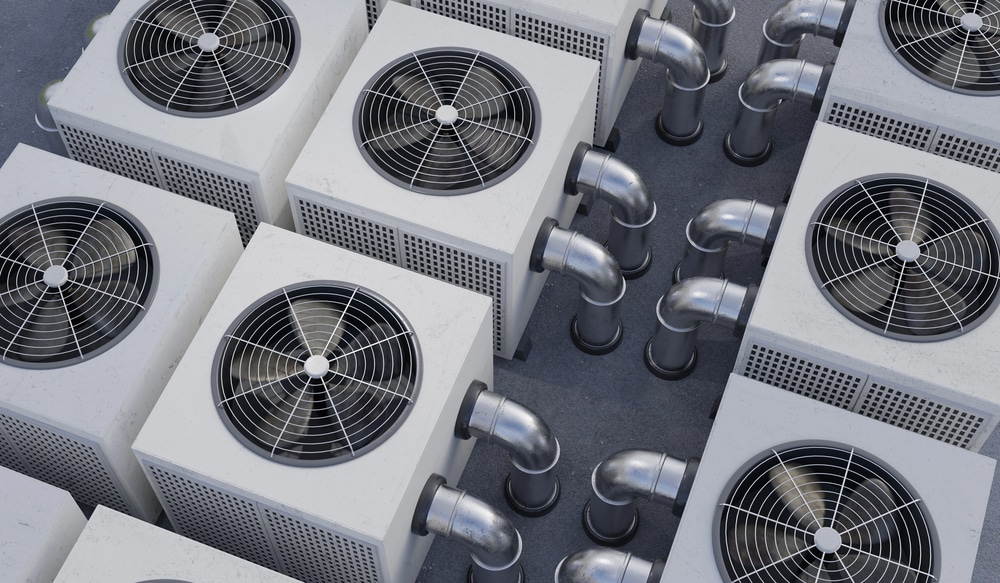
Does the constant hum or rattle from your air conditioner or heater disrupt your workplace productivity or comfort? You’re not alone.
Many businesses struggle with noisy heating and cooling systems that create distractions and reduce employee satisfaction. In this guide, Verde Solutions will explain how to reduce HVAC noise through practical solutions that address the root causes of these disruptive sounds.
Types of Noise You May Experience From HVAC Systems
Before we discuss how to reduce HVAC noise, you need to identify what type of sounds your system is making. Different sounds indicate varying problems, requiring specific solutions.
Rattling
This often indicates loose components or debris in the ductwork. The sound intensifies when air flows through the system, causing these loose parts to vibrate against metal surfaces. If your HVAC system produces excessive noise consistently, rattling could be one of the culprits.
Whistling
When air squeezes through a restricted space, it creates a high-pitched whistling sound. This commonly occurs at vents or within ducts that have become partially blocked or damaged. This is a common complaint with older systems or properties with poorly sealed ductwork.
Humming
Electrical components or the motor can produce a constant humming noise. This sound may signal normal operation, but it becomes concerning when the volume increases suddenly. In those cases, humming is a warning sign that signals the need for a professional evaluation.
Banging or Clanking
These alarming sounds typically suggest a serious mechanical issue with moving parts like the blower motor, compressor, or fan. These components might be loose, damaged, or hitting against other parts.
When your HVAC sounds unusually loud, turn it off and schedule a service call immediately. The blower motor and compressor are some of the most expensive parts to repair or replace, so it’s vital that you schedule service immediately after noticing loud banging sounds.
Understanding the Relationship Between Airflow Issues and HVAC Noises
Before diving into how to reduce HVAC noise, you need to understand why this issue occurs. Loud systems typically have airflow issues. When your HVAC system struggles to move air efficiently, noise levels increase dramatically and can disrupt comfort in commercial spaces.
Restricted airflow forces your system to work harder, amplifying operational sounds. Several factors can contribute to these restrictions, including clogged filters, blocked vents, or undersized ductwork. Dirty air filters not only increase noise but also reduce energy efficiency and compromise indoor air quality in your building.
Pressure imbalances in the duct system can also produce sound as air rushes unevenly through the space. These issues often arise when ductwork is incorrectly sized or features too many sharp bends. One of the most effective ways to reduce air duct noise is by scheduling routine cleaning.
Duct vibrations occur when metal expands and contracts with temperature shifts. These subtle yet persistent vibrations can echo throughout the building. To minimize this, proper duct mounting and insulation are essential to maintain a quieter indoor environment.
Effective Solutions To Keep Your Equipment Running Quietly
Implementing the right noise reduction techniques can transform your noisy HVAC system into quiet, efficient equipment. Here’s how to reduce HVAC noise:
Insulate the Ducts
Proper duct insulation serves a dual purpose, improving energy efficiency while reducing operational sounds. You can significantly decrease noise transmission by:
- Installing ductwork sound insulation lined with heat-resistant acoustic foam that absorbs sound waves before they travel through the ductwork
- Wrapping external ducts with Quiet Barrier materials that prevent vibrations from transferring to the surrounding structure
- Using flexible connectors at junction points to prevent the transmission of mechanical vibrations through the ductwork
Proper insulation reduces HVAC noise and improves thermal efficiency, potentially lowering energy costs over time.
Upgrade Your HVAC System
Older HVAC units typically produce more noise than newer models. Modern systems feature advanced sound-dampening technology to minimize operational noise, variable speed motors that reduce sounds at lower operating speeds, and insulated cabinets to contain operational sounds effectively. Investing in a quiet HVAC system might have a higher upfront cost, but it pays dividends in comfort, energy efficiency, and reduced maintenance issues.
Use a Duct Silencer
Duct silencers, also known as sound attenuators, are specialized components designed to reduce noise transmission through HVAC ductwork. They function by creating internal baffles that absorb sound energy as air flows through the system. These devices are effective at disrupting sound waves without significantly affecting airflow or system efficiency.
By targeting specific frequencies that tend to cause the most disruption, duct silencers offer a precise, efficient solution for minimizing noise. Installing these silencers is a smart way to reduce air duct noise while maintaining optimal system performance.
Adjust the Fan Speed
Many commercial HVAC systems run at higher speeds than necessary. By optimizing fan speeds, you can reduce the velocity of air moving through the system, which directly lowers noise levels. This also creates a more balanced airflow pattern throughout your building, which decreases energy consumption while simultaneously reducing unwanted noise.
Most modern systems allow for fan speed adjustments through the control system, making this a relatively simple change with significant benefits.
Install Sound Blankets
HVAC vibration dampeners, like sound blankets, are effective for containing noise from the main unit. Products such as VibraBlock Sound Deadening Material are specifically designed for HVAC applications and help reduce disruptive noise without interfering with system function.
Sound blankets are especially useful for rooftop units or equipment located near occupied spaces, making them a practical solution for commercial noise control.
The Benefits of a Quieter HVAC System
Now you know how to reduce HVAC noise, but is doing so really worth the effort? When you implement effective HVAC noise reduction strategies, you’ll notice:
- Improved workplace productivity: Excessive background noise distracts your team and kills productivity. A quieter HVAC system helps maintain focus and concentration among your team.
- Better communication: In client-facing businesses, clear communication is essential. Reducing background noise allows for easier conversations without requiring people to raise their voices or strain to hear.
- An extended equipment lifespan: Noise often indicates excessive strain on your system. By addressing the underlying causes, you can potentially extend the operational life of your HVAC equipment.
- Enhanced energy efficiency: Many noise-reduction techniques also improve system efficiency. Properly insulated ducts, clean filters, and optimized airflow all contribute to lower energy consumption rates.
- An increased property value: Commercial properties with quiet, efficient HVAC systems generally command higher values and attract better tenants who appreciate the comfortable environment.
The benefits of HVAC acoustic insulation and other noise-reduction methods extend far beyond simple comfort, offering tangible business advantages that impact your bottom line.
Still Having Issues With Your HVAC Making Loud Noises? Try These Additional Tips
Beyond the major solutions, there are several smaller steps you can take to further reduce HVAC noise in your commercial building. These strategies not only improve comfort but also help prevent long-term system issues that contribute to disruptive sound.
One of the most effective ways to avoid loud operational sounds is regular maintenance. Schedule professional inspections at least twice yearly to tighten loose components that could cause rattling or vibration. Maintenance crews will clean debris from ductwork that may obstruct airflow and lubricate moving parts to reduce friction-related sounds.
Strategic equipment placement also plays a key role in minimizing noise. When designing your HVAC layout, be sure to position air handlers and other mechanical systems away from quiet work areas. Whenever possible, use dedicated mechanical rooms with soundproofing barriers, and consider installing rooftop units directly above storage areas instead of workspaces.
When To Consult HVAC Professionals
While some tips for reducing HVAC noise can be handled by yourself, it’s often best to call in the experts.
If your system’s noise levels suddenly increase without a clear reason, or you begin to hear grinding, screeching, or banging sounds, it’s time to consult a professional. You should also reach out if basic maintenance and noise-reduction efforts haven’t worked. Licensed HVAC technicians have the tools and training needed to accurately assess complex issues.
They can conduct vibration analysis testing to uncover mechanical faults, perform airflow measurements to find pressure imbalances, and use acoustic assessments to develop effective noise control strategies. If you’re interested in installing any sound-dampening systems or cleaning your ductwork, you’ll need a commercial HVAC team as well.
Verde Solutions: Your Partner in Quieter, More Efficient HVAC Systems
Learning how to reduce HVAC noise is an important step toward creating a more comfortable, productive commercial environment. At Verde Solutions, we understand that every building has unique acoustic challenges requiring customized soundproofing HVAC solutions.
We specialize in diagnosing and resolving HVAC noise issues through comprehensive system testing and targeted improvements. Our team brings years of experience in helping businesses achieve quieter operations without sacrificing performance or efficiency.
Take advantage of our complimentary energy audit and HVAC consultation to discover how we can help reduce your system’s noise while improving its overall performance. We’re confident that after speaking with us, you’ll recognize Verde Solutions as the premier choice for addressing HVAC noise in your commercial space.
Call us at (800) 541-1137 to learn how to reduce HVAC noise in your commercial building today.

